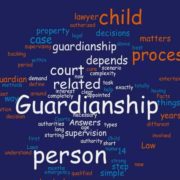Irrevocable Life Insurance Trust – Is It Right For You?
Cleveland, Ohio, Estate Planning lawyer, Daniel A. Baron, of Cleveland, Ohio, offers the following information on establishing an Irrevocable Life Insurance Trust (ILIT). Is it the right fit for you when creating your estate plan?
When you think about life insurance, you typically are going to use this as a vehicle to plan for the possibility of passing away while still having loved ones to support. What kinds of expenses do you look to cover after you pass?
- Mortgage expense
- Children’s future education
- Credit card debt
- Vehicle loans
- Funeral costs
- Your spouses’ daily needs
- Your children’s daily needs
- Spouse and children’s health needs
- Etc.
You may want to consider creating an Irrevocable Life Insurance Trust (ILIT). Quite simply this is another tool to maximize your estate tax savings while still giving you the benefits of insurance coverage. As the name states this is an irrevocable trust so you cannot remove this policy from the trust at a later date and have it revert to your personal name. You do maintain control over it as far as naming the Trustees and the Beneficiaries and changing them at any time in the future if the need arises.
As mentioned this would serve as a great way to maximize your tax liability upon your death. Keeping in mind that when you pass away and insurance company sends your check to you, the government is waiting for their share of the funds. So the benefits of putting your life insurance policy in the Trusts name:
- Reduces the size of your estate, therefore reducing your tax liability
- You can consider reducing the amount of coverage since you will not have to guard against the tax hit thus savings you insurance premium dollars
- The cash value of the policy is protected against creditors
- If your spouse, children, or other named beneficiaries are receiving any government aid such as Medicaid, this helps protect the benefits your beneficiaries are receiving
To see whether or not an Irrevocable Life Insurance Trust is the best fit for your tax planning situation, you need to speak with an experienced Estate Planning lawyer. Contact Daniel A. Baron of Baron Law today at 216-573-3723 to answer any questions you may have on a creating an ILIT. I welcome the opportunity to work with you and recommending the best solution for your needs.
Helping You and Your Loved Ones Plan for the Future
















